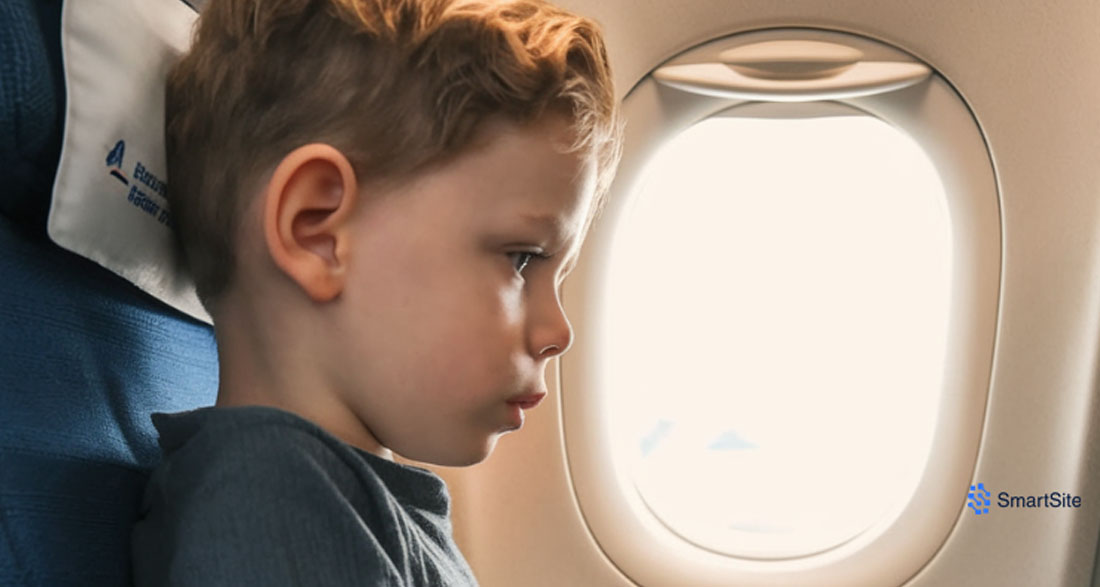I never thought a simple flight could turn into something so unforgettable. It all started with a crumpled note and a ten-dollar bill, and ended up creating a bond that changed my life forever.
It was just another trip home to visit my grandparents. I had flown countless times before, and my routine never changed: board the plane, stow my carry-on, then either read or catch up on work. But this flight was different.
As I got on the plane, I saw a young boy, maybe ten or eleven years old, sitting in the seat next to mine. I figured his parents were nearby, probably his mom, maybe in the bathroom.
Once the plane started taxiing down the runway, I realized something: the boy was alone. He was fidgeting in his seat, glancing around nervously. It was clear flying made him uncomfortable.
I gave him a small, reassuring smile, but he quickly looked away, focusing intently on the safety card in front of him. He seemed overwhelmed, so I didn’t push him.
Right before takeoff, he held out a trembling hand, offering me a crumpled piece of paper and a ten-dollar bill. He didn’t say a word or even look at me, just waited for me to take it. I was confused but unfolded the note. The neatly written message said:
“Please, if you’re reading this, it means my son with autism is sitting next to you. He may be nervous and could ask several times when the plane will land. I am his mom, and I will meet him at the airport. Please be kind and patient. Here’s $10 for your trouble, and here’s my number if he needs anything.”
As I finished reading, a lump formed in my throat. The boy sat there, his small fists clenched, staring straight ahead. The ten dollars in my hand felt like a heavy symbol of his mother’s trust.
I immediately grabbed my phone, connected to the plane’s Wi-Fi, and texted the number on the note: “Hi, I’m Derek. I’m sitting next to your son. He’s doing just fine, but I wanted to let you know I’m here if he needs anything.”
Her response came almost instantly: “Thank you so much, Derek. He’s had a rough few days, but knowing you’re there helps a lot. Please let him know I’m thinking of him.”
I turned to the boy and said gently, “Hey, buddy, your mom says hi. She’s thinking about you.”
He looked at me for a brief second, his face softening, then turned to the window. Even though he wasn’t much of a talker, I wanted to make the flight as easy as possible for him.
“Do you like airplanes?” I asked, hoping to get him talking.
He gave a small nod but still didn’t look at me.
“Me too,” I said, leaning back in my seat. “It’s like being a bird, flying through the clouds.”
Though he didn’t respond, I noticed him relax just a little. I wanted to do more, so I signaled the flight attendant and used the ten dollars the boy had given me. “Can I get a snack for my friend here?” I asked, smiling.
The boy looked surprised when I handed him a bag of pretzels and a soda. “Here you go,” I said, passing him the snacks. “I figured you might be hungry.”
He hesitated for a moment before accepting them, mumbling a quiet, “Thank you.” It was the first time he had spoken since we boarded, and I considered it a victory.
Throughout the flight, I kept talking to him, answering his questions about when the plane would land and what we might be flying over. I kept my voice calm, trying to ease his nerves.
At one point, I decided to take a selfie with him to send to his mom, just to reassure her. Before snapping the picture, I asked, “Is it okay if we take a picture to send to your mom?”
To my surprise, he nodded and leaned in closer so he’d be in the frame. After taking the photo, I showed it to him, and for the first time, he gave me a small, shy smile. For someone who wasn’t used to interacting with kids, that moment felt huge.
“Can I send this to your mom?” I asked, a little nervously.
He nodded, so I sent it with a quick message: “He’s doing great! We’re having a good time.”
Her reply came quickly: “Thank you! You have no idea how much this means to me.”
I realized just how hard it must have been for her to let her son fly alone, trusting that a stranger would help him out. By the time we started our descent, the boy was much more at ease. He even started telling me about his favorite video games and how excited he was to see his mom. It was like he was a completely different kid from the one I’d met at the start of the flight.
When we landed and the seatbelt sign turned off, he asked, “Will you walk with me to get my luggage? I’m supposed to meet my mom there.”
“Of course,” I said, without hesitation. “We’ll find her together.”
We exited the plane and made our way through the bustling terminal toward baggage claim. There, I saw a woman scanning the crowd anxiously. The moment she spotted her son, her face lit up, and she rushed over to him, pulling him into a tight hug.
“Thank you,” she said to me, her voice thick with emotion. “You have no idea what this means to me.”
I smiled, warmth spreading through my chest. “It was no trouble at all. He’s a great kid.”
As I shook her hand, I felt a strange but pleasant spark. Without thinking, I asked, “Would you like to grab a coffee sometime? As a way for you to thank me?”
To my surprise, she smiled and said, “I’d like that.”
As we waited for her son’s luggage, she shared the story of his solo flight. He had been visiting his dad, her ex-husband, who had refused to fly back with him at the last minute, leaving the boy to fly home alone with just a note and ten dollars.
Over the next few months, Diane and I got to know each other better, and before long, we were in a long-distance relationship. Fast forward two years, and that shy, nervous boy on the plane is now my stepson. Diane, now my wife, still laughs when she tells people how a crumpled note and ten dollars led to the best thing that ever happened to us.
And that’s how a routine flight changed my life forever.














